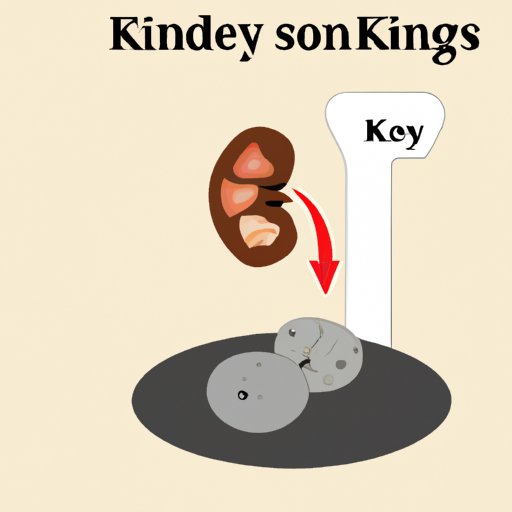
Introduction
Kidney stones are a common and painful condition that affects millions of people around the world. They are solid masses made up of tiny crystals and can form in one or both kidneys. Kidney stones can cause a range of symptoms that can be debilitating, such as severe lower back pain, nausea, and vomiting.
There are different types of kidney stones, including calcium oxalate stones, uric acid stones, and struvite stones. Each type of stone has different characteristics, which can affect diagnosis and treatment.
In this article, we will explore how to diagnose kidney stones and what you can do to prevent and treat them.
Prevalence and Diagnostic Tests
Approximately 10% of people develop kidney stones at some point in their lives, with men being more likely to develop them than women. Risk factors for developing kidney stones include a diet high in salt or protein, a lack of fluids, and a family history of kidney stones.
To diagnose kidney stones, your doctor may use one or more diagnostic tests. Common tests include:
- Imaging tests: X-rays, ultrasounds, and CT scans can help doctors identify the location and size of the kidney stones.
- Blood tests: Blood tests can identify if there are high levels of minerals that contribute to kidney stone formation.
- Urine analysis: Urine tests can analyze the composition of the urine and detect minerals or substances that can contribute to kidney stone formation.
Personal Account and Preparation
Someone who has gone through kidney stones describes feeling intense pain in the lower abdomen or groin area. The level of pain varies from person to person, but it can be severe enough to cause nausea and vomiting.
If your doctor thinks you may have kidney stones, you will likely be asked to provide a urine sample. You may be instructed to drink plenty of fluids to help flush out the stones. It is essential to follow your doctor’s instructions carefully.
Importance of a Proper Diagnosis
A proper diagnosis is essential to receive appropriate treatment for kidney stones. Your doctor will determine the underlying cause of kidney stones to develop a personalized treatment plan. In some cases, untreated kidney stones can lead to complications, such as chronic kidney disease or kidney failure. Therefore, it is essential to seek medical attention as soon as possible if you experience kidney stone symptoms.
There are several methods doctors use to diagnose kidney stones, and each offers advantages and disadvantages. Imaging tests, such as X-rays and CT scans, can identify the location and size of the stones. Blood tests can measure the level of minerals that contribute to the formation of kidney stones. Urine tests can analyze the composition of the urine and detect minerals or substances that can cause kidney stones.
Causes and Early Detection
There are several factors that can contribute to the development of kidney stones, including diet, genetics, and dehydration. If you experience symptoms such as lower back pain, nausea, or vomiting, it is essential to seek medical attention as soon as possible. Early detection can help prevent the development of chronic kidney disease and other complications.
Kidney stone diagnosis typically begins with a physical examination and medical history. Your doctor may ask about any underlying health conditions you have and your family history of kidney stones. They may also order blood and urine tests to confirm the diagnosis. Imaging tests, such as X-rays, CT scans, or ultrasounds, can help identify the location and size of the stones.
Conclusion
Kidney stones are a common condition that can cause severe pain and discomfort. If you suspect that you may have kidney stones, it is essential to seek medical attention right away. Kidney stone diagnosis typically involves a combination of imaging tests, blood tests, and urine analysis.
A proper diagnosis is critical to ensure you receive appropriate treatment for your symptoms. Do not hesitate to talk to your doctor about any concerns you may have. Remember, early detection is crucial to effective treatment and prevention of long-term complications.





